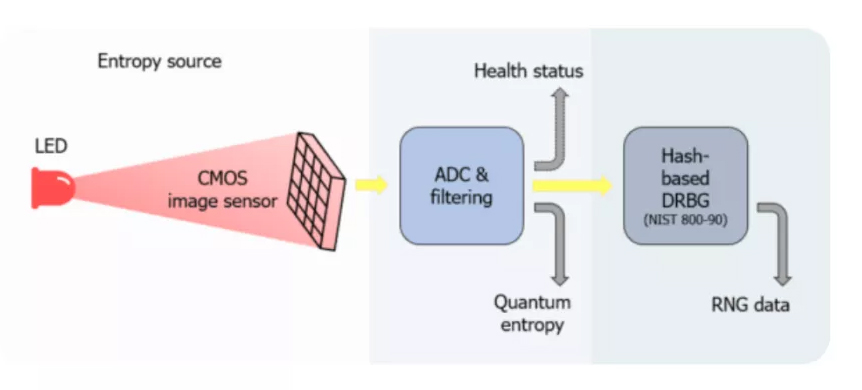There are many ways to generate random numbers. But if the method is bound by the laws of classical physics, the numbers can be predicted.
For this reason, most sources of random number generators aren't truly random, simply because they use algorithms to produce sequences of numbers that look random. In other words, the algorithms use patterns to generate the random numbers.
What this means, if anyone knows or see the underlying algorithm, the numbers that are supposed to be random, become completely predictable.
Fortunately, researchers have made good progress in developing technologies that can generate and distribute truly random numbers. By measuring the unpredictable attributes of subatomic particles, for example, people can use the rules of quantum mechanics to encrypt messages.
And this time, Samsung introduced the Galaxy A Quantum.
The phone that was presented and marketed in May 2020 shares many of its parts with the Galaxy A71 5G. But additionally, it is shipped with a quantum security chip (hence the name Quantum).

Inside, the quantum chip is SKT IDQ S2Q000, developed by the Swiss company ID Quantique, a company acquired by SK Telecom, a South Korean wireless telecommunications operator.
ID Quantique, a Geneva-based supplier that specializes in quantum encryption for telecommunications and IoT, is at the forefront of this technology.
The chip is used to generate random numbers (a quantum random number generator, or QRNG) that would be less predictable and more secure.
This is made possible, as the chip can generate tons of random numbers per second using a built-in CMOS image sensor to detect photons emitted by LED.
When turned on, the LED emits “image noise.” Then, the CMOS sensor goes to work by capturing its quantum randomness.
Through the noise's unpredictable patterns, the chip can generate "truly" random numbers for encryption keys to enhance security of sensitive data, like when logging in to SK Telekom's services, using two-factor authentication, biometric authentication and a mobile electronic certification service based on blockchain technology.
According to Samsung and SK Telekom, the quantum chipset can also be used to store personal documents to prevent forgery.
According to Grégoire Ribordy from ID Quantique:
“The quantum random number generation chipset is optimized for smartphones with a compact, low-power product,”
“The launch of the Galaxy A Quantum is the first in the mass market where quantum security technology is popular. It is meaningful as an applied example.”
And according to Yoo Young-sang, SK Telecom's MNO business manager:

It should be noted that the 5G Galaxy A Quantum comes after four years of development.
The quantum random number generator (QRNG) chipset could be dated back to 2016, when SK Telecom's Quantum Lab made a sudden proposal.
In 2016, prototypes of the chip was made, in the form of a USB device.
The continuous development has led the chip to shrink in size, and lastly, to the size of 2.5 mm x 2.5 mm x 0.8 mm.
The chipset passed Samsung Electronics' quality standards in 2018, and mass production began in April 2020.
Looking forward, both SK Telecom and Samsung are planning to increase the lineup of smartphones loaded with quantum security technology.
This isn’t the first time that Samsung and SK Telecom have partnered to create a world's first. Back in September of 2019, the two companies teamed up to create the first 8K TV with 5G.
As for Samsung, it has its own quantum projects. But this Galaxy A Quantum is the first time it applied the technology into a smartphone.